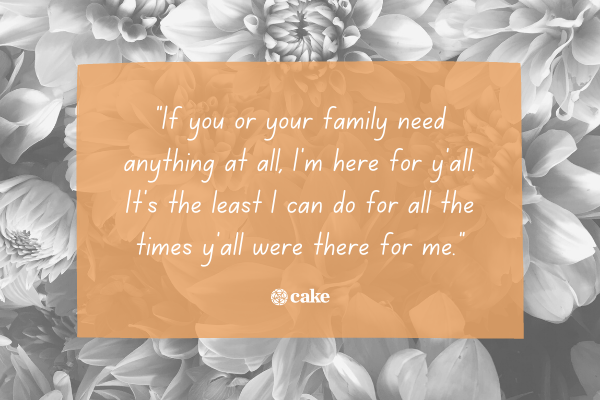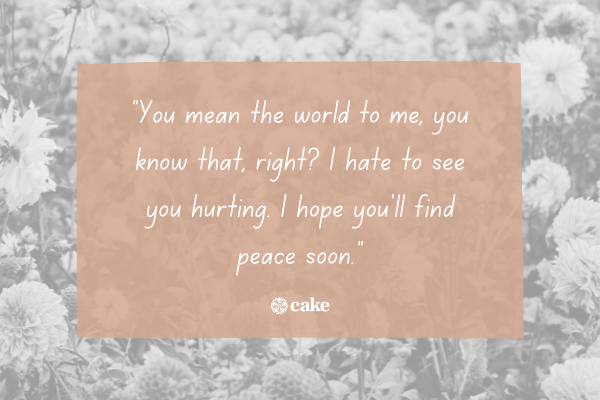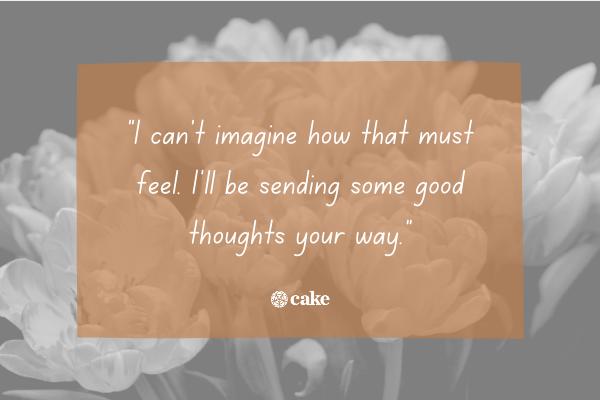We Continue to Pray for Het
Not everyone can be a board-certified therapist when it comes to comforting others. And, quite frankly, many board-certified therapists will likely attest they don't always get it right. So when someone you know experiences a bad day — or, in this case, a loss or tragedy, how do you know what to say?
Jump ahead to these sections:
- How to Say 'I'm Praying for You and Your Family'
- How to Say 'I'm Praying for You' to a Loved One
- How to Say 'I'm Praying for You' to a Stranger or Acquaintance
Though telling someone that you're praying for them may sound like the best option, perhaps it won't cut it. Maybe the person you're comforting doesn't relate well to prayer. Or, maybe you're not inclined to pray either — and there's nothing wrong with that. So fear not. There are plenty of other ways to extend comfort in not so many words.
You may also be interested in how to express condolences or other ways to say that you're sorry for someone's loss .
How to Say 'I'm Praying for You and Your Family'

If you know someone whose entire family is affected by a tragedy or loss, you may feel the need to extend your well wishes. This is especially true if you're trying to think of what to say when someone has a sick family member , for example. It's understandable that extending your prayers to an entire family may seem heavy, but with the right wording, your sentiment will certainly be received.
Of course, feel free to make any of the following suggestions (in any of the following sections) your own.
1. "I've been thinking a lot about you and your family over the past few weeks. Let me know how I can help you all."
When dancing around the subject of "praying" for someone, it's quite easy to substitute the word "thinking" if it feels more appropriate.
After all, praying shouldn't feel much more complicated than thinking of the well-being of others. You may also wish to extend a hand to your friend or loved one's family, which they'll surely appreciate.
2. "How are you and your family doing? You guys have been on my mind."
Saying that someone's family has been on your mind would make sense if they're dealing with a loss, or, perhaps acknowledging the death anniversary of a loved one .
And, of course, asking how they're doing and genuinely caring to hear the answer can speak volumes, too.
3. "Every day, I set aside some time to send you and your family some good vibes. Hope you've been getting them. If not, I'll try harder."
Sending "good vibes" and the general tone of this message is more light-hearted than some others.
However, you're the best judge of your relationship with your friend or loved one, so perhaps they'd appreciate this sentiment over something more serious.
4. "I hope this doesn't upset you with me saying this, but I think about you and your family every day. I really hope you all are doing OK."
Telling someone, or rather, a group of people that you're thinking of them often and that you hope they're doing well about covers it all.
By saying you hope to not upset them, too, also opens the door for them to be honest with you.
5. "Let the rest of your family know I'm sending my love. You guys are so strong, and you'll get through this."
You should never feel in the wrong to send some love and to remind others how strong you think they are. It's often at our weakest points, too, that we can benefit from this sort of reminder.
6. "If you or your family need anything at all, I'm here for y'all. It's the least I can do for all the times y'all were there for me."
Reminding others that you want to be there for them as they were there for you is important. Some people have a hard time asking for help. However, if you remind them that you're simply returning the favor, they may have a much easier time doing so.
How to Say 'I'm Praying for You' to a Loved One

Showing up for our loved ones is important, but it can often be one of the most difficult obligations we have. You may have an easier time talking to strangers than you do talking to loved ones at times.
And that's totally OK. When trying to comfort a loved one, it's important to express that you're there for him or her, and not stress so much about the exact words you choose.
7. "I love you, and I've been thinking about how to help you work through this. I'm always here to talk."
Extending your help is often the best way to show that you care about someone. And, letting your loved one know that you're simply there to talk, too, isn't a bad idea. It's a "low-pressure" way of checking in and opening the door, especially if you don't talk to this person very often.
8. "You mean the world to me, you know that, right? I hate to see you hurting. I hope you'll find peace soon."
Expressing your hope that your loved one finds peace is important. After all, peace may feel like the furthest thing for them. Hearing that someone is thinking of them in this way expresses the same sentiment that prayer does without saying so.
9. "Let me know what I can do to make this situation any easier. I will do anything, and I mean it."
Again, letting your loved one know that you'd move heaven and earth for them (if you truly mean it) is important. Don't take your phrasing lightly, but at the same time, don't stress over it too much, and say what feels right.
10. "I've been having a hard time focusing on other things since you've been going through this. You're not alone."
Especially when coming on hard times, people may feel alone. This is often the worst feeling, as it takes a specific person (and a specific set of circumstances) to feel empowered by solitude.
Letting your loved one know that they are not alone will likely make them feel worlds better, even if they should have known this already. Some people need reminders.
11. "I love you, and you're always in my thoughts — especially lately."
Focusing on your love for this person is a good way to cover a lot of ground. If you don't talk very often, you're reminding him or her that you're in good standing, and they should feel comfortable coming to you.
12. "What else can I do for you? I don't want you to feel like you're burdening me. I just want you to find the peace and healing you deserve."
It's always a good idea to remind your loved ones that they're welcome to ask you for help, and they're not burdening you by doing so. It'll also make them feel a bit of peace, too, that you're keeping their peace and healing on your mind.
Not ready to start your will?
It's a big step and we get it! Share your email and we'll remind you in a few days.
Thank you for subscribing. Expect an email soon!

How to Say 'I'm Praying for You' to a Stranger or Acquaintance

Navigating a difficult conversation with a stranger or acquaintance can be a strange blessing. Essentially, it can make or break your relationship going forward.
We're not saying so as to stress you out — however, we hope this idea empowers you that your words can truly impact this person, even if you never cross paths again. You should also feel a strange sense of peace, too, that if you say something out of the ordinary for you, you may never see this person again.
So, go ahead and care a little (or a lot).
13. "I hope this doesn't come off too strong, but I've been thinking of you. I hope you're OK."
Acknowledging that you may be bold in your well wishes is important in some situations. You want the person you're speaking with to be comfortable and receptive to what you're about to say — not caught off guard.
14. "I've been thinking of you and what you're going through. I'm here to talk if you ever need someone."
It's likely that you have a positive opinion of a lot of people you don't interact with much — whether it's at your workplace, your gym, your neighborhood, or anywhere else. Chances are that these people have the same positive opinion of you.
Sometimes all it takes is a small gesture like this to open the door for friendship and support that can last a long time.
15. "I can't imagine how that must feel. I'll be sending some good thoughts your way."
There are quite a few commonplace terms that may rub people the wrong way, especially when they're emotional. If "I'm sorry" or "I'm praying for you" don't seem like the best options, this may work well in their place.
16. "I've been thinking about your situation. If there's anything I can do, please don't feel strange for letting me know. I'd love to help."
Telling someone they've been on your mind and they shouldn't feel weird coming to you is important to say, and you shouldn't feel odd saying so. Sometimes people don't know just how much support is out there.
17. "I know we don't know each other very well, but I truly hope you find peace and heal."
This is a good option if you don't think you'll see who you're speaking to very often. It covers a lot of ground, and it shows that you're hoping that they heal, which is, again, the ultimate goal.
18. "I want the best for you, really, I do. I've always admired you. I'll be thinking of you throughout this ordeal!"
It's never an odd time to tell someone that you admire them and that you wish the best for them. Though it doesn't necessitate a loss or a tragedy to say so, it is certainly an even more appropriate time.
You Never Know How Much Someone Needs to Hear Something
As cryptic as that may sound, you really don't know how much someone may need to hear something. Our words (and our actions, too) hold so much weight, often more than we may realize. Though we can't always get it right, we can certainly try. You should never feel embarrassed, ashamed, or odd telling someone you're praying for them.
And, of course, if that choice of words doesn't quite fit, you have all of the options above. For navigating other conversations, like saying you're sorry (and really trying to mean it), check out the rest of Cake .
littlefieldwituractle.blogspot.com
Source: https://www.joincake.com/blog/praying-for-you/
0 Response to "We Continue to Pray for Het"
Post a Comment